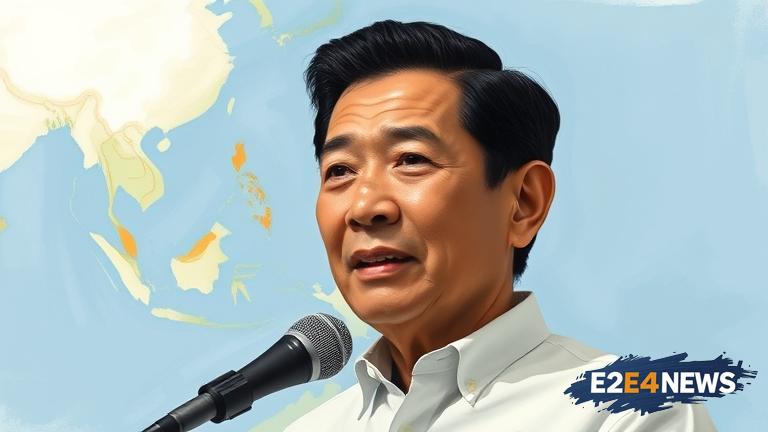The Philippines President, Ferdinand Marcos Jr., has voiced his endorsement of the term ‘Indo-Pacific’ as a more accurate and inclusive description of the region, as opposed to the previously used ‘Asia-Pacific’. This statement was made during his visit to a neighboring country, where he emphasized the importance of recognizing the evolving nature of the region. According to President Marcos Jr., the ‘Indo-Pacific’ term better reflects the significant role that India plays in the region, as well as the growing connections between the Indian and Pacific Oceans. He also highlighted the need for a more comprehensive understanding of the region’s dynamics, taking into account the complex interplay of economic, political, and strategic factors. The President’s remarks were seen as a significant development, as they underscore the Philippines’ commitment to strengthening ties with other nations in the region. The ‘Indo-Pacific’ concept has gained traction in recent years, with many countries and organizations adopting it as a more accurate and forward-looking description of the region. This shift in terminology is also seen as a response to the changing geopolitical landscape, with the rise of new global powers and the increasing importance of the Indian Ocean in international trade and security. President Marcos Jr.’s endorsement of the ‘Indo-Pacific’ term is expected to have significant implications for the region, as it may lead to a reevaluation of existing alliances and partnerships. The Philippines, as a key player in the region, is likely to play a crucial role in shaping the future of the ‘Indo-Pacific’ concept. The country’s strategic location, situated at the crossroads of the Indian and Pacific Oceans, makes it an important hub for trade, commerce, and cultural exchange. The ‘Indo-Pacific’ region is home to some of the world’s most dynamic and rapidly growing economies, including India, China, Japan, and South Korea. The region is also characterized by a diverse range of cultures, languages, and political systems, making it a complex and fascinating area of study. Despite the many opportunities and challenges presented by the ‘Indo-Pacific’ region, there are also concerns about the potential risks and uncertainties associated with this concept. Some analysts have warned that the ‘Indo-Pacific’ term may be seen as a attempt to contain or counterbalance the growing influence of China in the region. Others have expressed concerns about the potential for increased militarization and competition in the region, which could have negative consequences for regional stability and security. However, President Marcos Jr.’s endorsement of the ‘Indo-Pacific’ term is seen as a positive development, as it reflects the Philippines’ commitment to promoting greater cooperation and understanding among nations in the region. The President’s statement is also expected to have significant implications for the Philippines’ relationships with other countries in the region, including India, Japan, and Australia. These countries have been among the strongest advocates of the ‘Indo-Pacific’ concept, and the Philippines’ endorsement is likely to be seen as a welcome development. In conclusion, the ‘Indo-Pacific’ term is a more accurate and inclusive description of the region, and President Marcos Jr.’s endorsement is a significant development that reflects the Philippines’ commitment to promoting greater cooperation and understanding among nations in the region. The concept of the ‘Indo-Pacific’ is complex and multifaceted, and it will require careful consideration and analysis to fully understand its implications and potential consequences. Nevertheless, the ‘Indo-Pacific’ region is likely to play an increasingly important role in shaping the future of global politics, economics, and security, and the Philippines is well-positioned to play a key role in this process.





